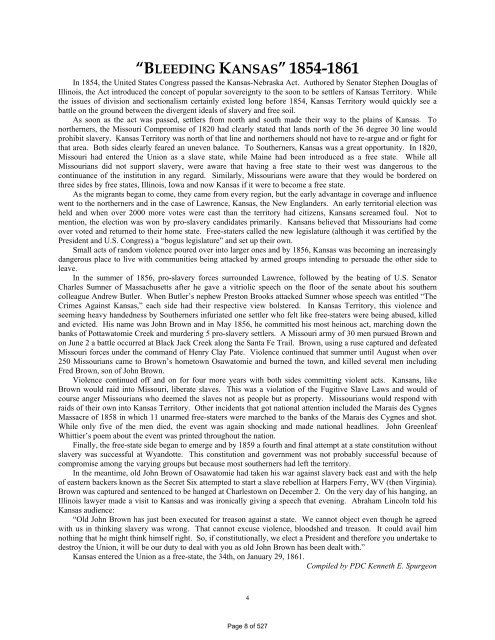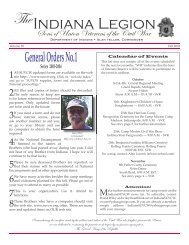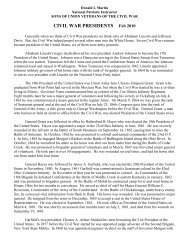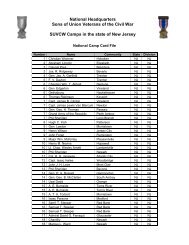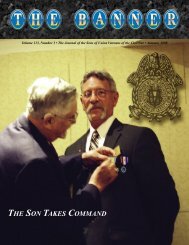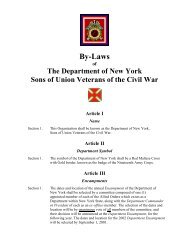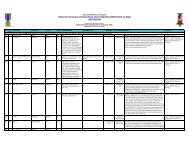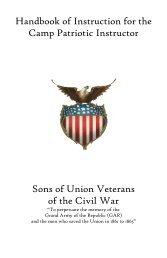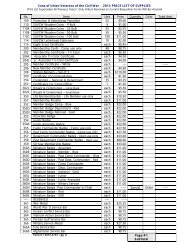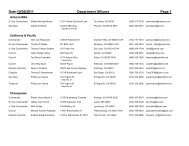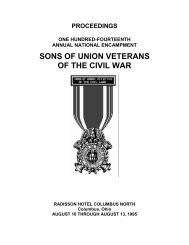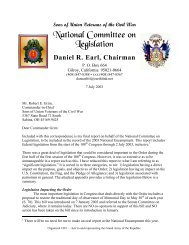Marriot Hotel Overland Park, Kansas August 12 - Sons of Union ...
Marriot Hotel Overland Park, Kansas August 12 - Sons of Union ...
Marriot Hotel Overland Park, Kansas August 12 - Sons of Union ...
Create successful ePaper yourself
Turn your PDF publications into a flip-book with our unique Google optimized e-Paper software.
“BLEEDING KANSAS” 1854-1861<br />
In 1854, the United States Congress passed the <strong>Kansas</strong>-Nebraska Act. Authored by Senator Stephen Douglas <strong>of</strong><br />
Illinois, the Act introduced the concept <strong>of</strong> popular sovereignty to the soon to be settlers <strong>of</strong> <strong>Kansas</strong> Territory. While<br />
the issues <strong>of</strong> division and sectionalism certainly existed long before 1854, <strong>Kansas</strong> Territory would quickly see a<br />
battle on the ground between the divergent ideals <strong>of</strong> slavery and free soil.<br />
As soon as the act was passed, settlers from north and south made their way to the plains <strong>of</strong> <strong>Kansas</strong>. To<br />
northerners, the Missouri Compromise <strong>of</strong> 1820 had clearly stated that lands north <strong>of</strong> the 36 degree 30 line would<br />
prohibit slavery. <strong>Kansas</strong> Territory was north <strong>of</strong> that line and northerners should not have to re-argue and or fight for<br />
that area. Both sides clearly feared an uneven balance. To Southerners, <strong>Kansas</strong> was a great opportunity. In 1820,<br />
Missouri had entered the <strong>Union</strong> as a slave state, while Maine had been introduced as a free state. While all<br />
Missourians did not support slavery, were aware that having a free state to their west was dangerous to the<br />
continuance <strong>of</strong> the institution in any regard. Similarly, Missourians were aware that they would be bordered on<br />
three sides by free states, Illinois, Iowa and now <strong>Kansas</strong> if it were to become a free state.<br />
As the migrants began to come, they came from every region, but the early advantage in coverage and influence<br />
went to the northerners and in the case <strong>of</strong> Lawrence, <strong>Kansas</strong>, the New Englanders. An early territorial election was<br />
held and when over 2000 more votes were cast than the territory had citizens, Kansans screamed foul. Not to<br />
mention, the election was won by pro-slavery candidates primarily. Kansans believed that Missourians had come<br />
over voted and returned to their home state. Free-staters called the new legislature (although it was certified by the<br />
President and U.S. Congress) a “bogus legislature” and set up their own.<br />
Small acts <strong>of</strong> random violence poured over into larger ones and by 1856, <strong>Kansas</strong> was becoming an increasingly<br />
dangerous place to live with communities being attacked by armed groups intending to persuade the other side to<br />
leave.<br />
In the summer <strong>of</strong> 1856, pro-slavery forces surrounded Lawrence, followed by the beating <strong>of</strong> U.S. Senator<br />
Charles Sumner <strong>of</strong> Massachusetts after he gave a vitriolic speech on the floor <strong>of</strong> the senate about his southern<br />
colleague Andrew Butler. When Butler’s nephew Preston Brooks attacked Sumner whose speech was entitled “The<br />
Crimes Against <strong>Kansas</strong>,” each side had their respective view bolstered. In <strong>Kansas</strong> Territory, this violence and<br />
seeming heavy handedness by Southerners infuriated one settler who felt like free-staters were being abused, killed<br />
and evicted. His name was John Brown and in May 1856, he committed his most heinous act, marching down the<br />
banks <strong>of</strong> Pottawatomie Creek and murdering 5 pro-slavery settlers. A Missouri army <strong>of</strong> 30 men pursued Brown and<br />
on June 2 a battle occurred at Black Jack Creek along the Santa Fe Trail. Brown, using a ruse captured and defeated<br />
Missouri forces under the command <strong>of</strong> Henry Clay Pate. Violence continued that summer until <strong>August</strong> when over<br />
250 Missourians came to Brown’s hometown Osawatomie and burned the town, and killed several men including<br />
Fred Brown, son <strong>of</strong> John Brown.<br />
Violence continued <strong>of</strong>f and on for four more years with both sides committing violent acts. Kansans, like<br />
Brown would raid into Missouri, liberate slaves. This was a violation <strong>of</strong> the Fugitive Slave Laws and would <strong>of</strong><br />
course anger Missourians who deemed the slaves not as people but as property. Missourians would respond with<br />
raids <strong>of</strong> their own into <strong>Kansas</strong> Territory. Other incidents that got national attention included the Marais des Cygnes<br />
Massacre <strong>of</strong> 1858 in which 11 unarmed free-staters were marched to the banks <strong>of</strong> the Marais des Cygnes and shot.<br />
While only five <strong>of</strong> the men died, the event was again shocking and made national headlines. John Greenleaf<br />
Whittier’s poem about the event was printed throughout the nation.<br />
Finally, the free-state side began to emerge and by 1859 a fourth and final attempt at a state constitution without<br />
slavery was successful at Wyandotte. This constitution and government was not probably successful because <strong>of</strong><br />
compromise among the varying groups but because most southerners had left the territory.<br />
In the meantime, old John Brown <strong>of</strong> Osawatomie had taken his war against slavery back east and with the help<br />
<strong>of</strong> eastern backers known as the Secret Six attempted to start a slave rebellion at Harpers Ferry, WV (then Virginia).<br />
Brown was captured and sentenced to be hanged at Charlestown on December 2. On the very day <strong>of</strong> his hanging, an<br />
Illinois lawyer made a visit to <strong>Kansas</strong> and was ironically giving a speech that evening. Abraham Lincoln told his<br />
<strong>Kansas</strong> audience:<br />
“Old John Brown has just been executed for treason against a state. We cannot object even though he agreed<br />
with us in thinking slavery was wrong. That cannot excuse violence, bloodshed and treason. It could avail him<br />
nothing that he might think himself right. So, if constitutionally, we elect a President and therefore you undertake to<br />
destroy the <strong>Union</strong>, it will be our duty to deal with you as old John Brown has been dealt with.”<br />
<strong>Kansas</strong> entered the <strong>Union</strong> as a free-state, the 34th, on January 29, 1861.<br />
Compiled by PDC Kenneth E. Spurgeon<br />
4<br />
Page 8 <strong>of</strong> 527


